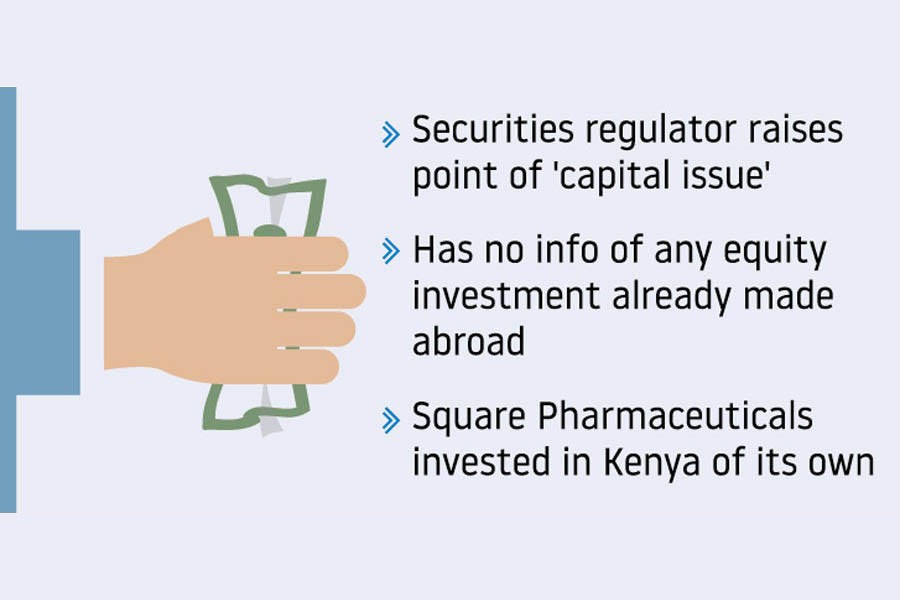BSEC joins BB-BIDA tug of war on authority over offshore investment

Published :
Updated :

Local businesses willing to make equity investment abroad will have to take consent from the securities regulator, too, if the deals are conducted in the form of 'capital issue'.
The third claimant to authority over such offshore investments comes after reports that Bangladesh Bank (BB) and Bangladesh Investment Development Authority (BIDA) are running parallel drafting rules in this regard.
The officials of the Bangladesh Securities and Exchange Commission (BSEC) say they, too, have authority on equity investments abroad amid developments of formulating separate guidelines by the central bank and the investment regulator.
"The issue of capital can be executed in the form of cash, debenture or bond. A company must take consent of the BSEC if the equity investments have any relation to 'issue of capital'," says Dr Shaikh Shamsuddin Ahmed, a BSEC commissioner.
Asked whether the companies which have so far made investment abroad received the BSEC consent, the commissioner said they are not aware of the exact type of investments made abroad.
As per sub-section (1) of section 2A of the Securities and Exchange Ordinance 1969, no issuer, or no company incorporated in Bangladesh, except with the consent of the commission, can make an issue of capital outside Bangladesh.
The term 'issue of capital' means the issuing of any securities whether cash or otherwise, the ordinance defines.
"The commission may, on an application made to it, make an order according recognition to an issue of capital made or to be made outside Bangladesh," according to the BSEC ordinance.
"While giving consent under the sub-section (1), the commission shall not fix the price of the issue."
Both BB and BIDA sources have said their draft rules on equity investment are at final stages of drafting.
Asked about BSEC's consent for equity investment, BIDA executive chairman Md Sirazul Islam said the existing laws, if any, regarding equity investment cannot be overwritten with the rules which are in pipeline.
"We have formulated detailed rules to ease and facilitate equity investment to be made abroad by local businesses," Mr Islam told the FE.
He said the businesses would have to comply with the provision, if really mentioned in existing laws, regarding taking consent from the securities regulator.
Preferring anonymity, a former BSEC commissioner said businesses would have to take consent from the securities regulator if equity investments are made in exchange for securities.
He said the grey area of equity investment is that sometimes the companies deposit share money and shares are issued at an opportune moment.
"The consent of the securities regulator is not required for equity investment until shares are issued against the money deposited by a company," said the commissioner.
Both the BB and the BIDA recently have come in discussion following their separate preparation on drafting guidelines for equity investment to be made outside the country by local businesses.
In this regard, the BIDA executive chairman, Mr Islam, said they had formulated the draft rules by holding discussions with relevant parties and organizations, including the central bank.
He said the central bank has role in facilitating the foreign exchange-related issues, and their draft guidelines have been formulated taking into account such role.
"Now, it is for the government to take final decision," said the BIDA executive chairman.
Earlier, nine companies had received the central bank's approval for making offshore investment.
The companies are Akij Jute Mills, MJL Bangladesh, Incepta Pharmaceuticals, DBL Group, Square Pharmaceuticals, Spectrum Engineering Consortium, ServicEngine, Beximco Pharmaceuticals, ACI HealthCare and Bangladesh Steel Re-Rolling Mills.
Asked, an official of the central bank said on anonymity that a company is not required to take BSEC consent if it wants to make equity investment abroad in line with the Foreign Exchange Regulation Act 1947.
An official of MJL Bangladesh said they did not take consent from the securities regulator in case of making overseas investment.
"Approval is not required from any regulator if a company makes overseas investment submitting detailed information to the central bank," the official said.
He said previously a large number of companies had made investment abroad without taking approval from any of the regulatory bodies.
"One-stop service should be ensured for the companies willing to make investment overseas," the official said.
Chief Financial Officer of Square Pharmaceuticals Mohammed Zahangir Alam said they had formed a subsidiary company in Nairobi, Kenya, subject to shareholders' approval taken at the annual general meeting.
"Square Pharmaceuticals has not raised capital from anyone issuing shares. In that case, BSEC's consent is not mandatory as our company made investment in its fully owned subsidiary company," Mr Alam said.
mufazzal.fe@gail.com


 For all latest news, follow The Financial Express Google News channel.
For all latest news, follow The Financial Express Google News channel.